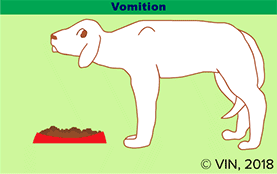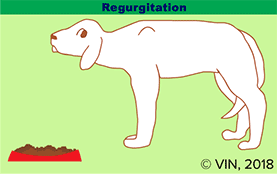Vomiting is when the contents of the stomach and upper intestine are forcefully ejected; regurgitation occurs when contents of the mouth, pharynx, or esophagus are expelled. For example, dogs with megaesophagus regurgitate; the food comes back up from the esophagus.
The most notable signs of vomiting are nausea and abdominal heaving. Pets that are nauseated tend to drool and look apprehensive. Some dogs and cats may have grumbling/growling stomach sounds (borborygmi).
Regurgitation is less involved. It’s more of a burp in which some of the contents in the esophagus, either liquid or solid, come back up. Although there might be some gagging or a bit of coughing as the contents move up, there’s no abdominal heaving involved. Usually, the food brought up is undigested and is covered with mucus. Regurgitation generally happens quite soon after the pet eats.
Basically, vomiting is an active effort, whereas regurgitation is pretty passive. See the difference in the videos below.
This one shows vomiting:
Vomition

This one shows regurgitation:
Regurgitation

It's not always easy to distinguish the product of vomiting from that of regurgitation, but some things your veterinarian will consider are:
- Heaving, retching, or abdominal compression doesn't occur with regurgitation, but can with vomiting.
- The regurgitated bolus (a lump of food the amount of a single swallow) is usually tubular in shape.
- The regurgitated bolus usually has a neutral or alkaline pH. If the food made it to the stomach prior to being regurgitated, however, the pH may be acidic (as vomited food would be). Your veterinarian may test the expelled material's pH level.
- A regurgitated bolus does not have bile in it. Vomited food may or may not contain bile.